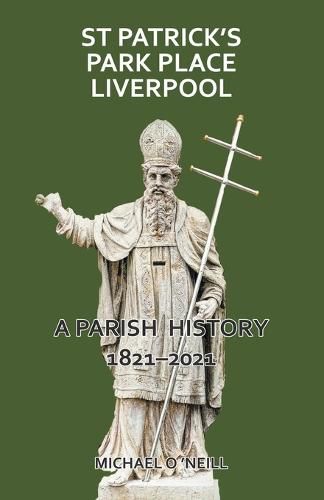Readings Newsletter
Become a Readings Member to make your shopping experience even easier.
Sign in or sign up for free!
You’re not far away from qualifying for FREE standard shipping within Australia
You’ve qualified for FREE standard shipping within Australia
The cart is loading…






This title is printed to order. This book may have been self-published. If so, we cannot guarantee the quality of the content. In the main most books will have gone through the editing process however some may not. We therefore suggest that you be aware of this before ordering this book. If in doubt check either the author or publisher’s details as we are unable to accept any returns unless they are faulty. Please contact us if you have any questions.
St Patrick’s is the oldest of Liverpool’s early post-Reformation Catholic churches to remain in use. Erected in the third decade of the nineteenth century, close to the city’s expanding docks, and designed to seat 1,800 people, it has a fortress-like construction, which took six years to complete, the foundations and burial pits being cut into the solid sandstone bedrock.
In 1816 a group of far-sighted laymen took out an unusual 5,000 year lease on the site. From the time of its opening in 1827, St. Patrick’s has always been a hub of local community activity in the Toxteth area of Liverpool.
The burial place of three of the ten ‘martyr priests’ who died during the 1847 typhus epidemic, the church in which Adolf Hitler’s nephew was baptised, the parish of Jack Traynor, miraculously cured at Lourdes in 1923, the survivor of street riots, massive bombing between 1940 and 1942 and the earthquake of 1974, with close links to the Australian Archdiocese of Adelaide, proud to have had footballers such as Robbie Fowler and Ian Callaghan attend its school, and currently the subject of detailed investigations by the University of Liverpool Department of Archaeology, St Patrick’s has a remarkable and unfolding story to tell as it approaches the start of its third century.
$9.00 standard shipping within Australia
FREE standard shipping within Australia for orders over $100.00
Express & International shipping calculated at checkout
This title is printed to order. This book may have been self-published. If so, we cannot guarantee the quality of the content. In the main most books will have gone through the editing process however some may not. We therefore suggest that you be aware of this before ordering this book. If in doubt check either the author or publisher’s details as we are unable to accept any returns unless they are faulty. Please contact us if you have any questions.
St Patrick’s is the oldest of Liverpool’s early post-Reformation Catholic churches to remain in use. Erected in the third decade of the nineteenth century, close to the city’s expanding docks, and designed to seat 1,800 people, it has a fortress-like construction, which took six years to complete, the foundations and burial pits being cut into the solid sandstone bedrock.
In 1816 a group of far-sighted laymen took out an unusual 5,000 year lease on the site. From the time of its opening in 1827, St. Patrick’s has always been a hub of local community activity in the Toxteth area of Liverpool.
The burial place of three of the ten ‘martyr priests’ who died during the 1847 typhus epidemic, the church in which Adolf Hitler’s nephew was baptised, the parish of Jack Traynor, miraculously cured at Lourdes in 1923, the survivor of street riots, massive bombing between 1940 and 1942 and the earthquake of 1974, with close links to the Australian Archdiocese of Adelaide, proud to have had footballers such as Robbie Fowler and Ian Callaghan attend its school, and currently the subject of detailed investigations by the University of Liverpool Department of Archaeology, St Patrick’s has a remarkable and unfolding story to tell as it approaches the start of its third century.